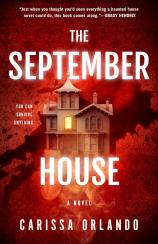The September House
Review
The September House
Great tales of horror often challenge readers to consider where psychological terror ends and the supernatural takes over. Walking the tightrope between these two causes for hauntings, Carissa Orlando offers THE SEPTEMBER HOUSE, a novel whose breezy readability belies its dark themes and gross images. It’s a haunted house story for those who enjoy the genre for all kinds of reasons.
Margaret and Hal dreamed of their ideal home for years. Finally, with their daughter grown and on her own, they invest in a gorgeous house found at a great price. While the real estate agent discloses that more than one death has occurred there, the couple only have eyes for the beautiful Victorian. It will be a place where Hal can write more novels and Margaret can spend her days painting. Everything is lovely until September rolls around.
"Carissa Orlando starts THE SEPTEMBER HOUSE with a light hand and a sly wit. But as the novel (and the September within it) moves on, she confronts readers with ideas about trauma, violence, power, abuse, self-worth and forgiveness."
At the start of September, Margaret hears a low moaning and sees blood begin to drip down the walls. By the end of the month, the moans have morphed into screams, the blood is flowing like a river down the staircase, and about 10 ghosts are harassing them (except for the one incredibly helpful ghost who mostly wants to roast chicken and make tea for Margaret). The couple survive the month. At the start of October, the blood goes away, the screams abate, and the ghosts settle down into an uneasy but (for Margaret) manageable relationship with the living inhabitants of the house.
Every subsequent September for the next few years is a repeat of the first. For Hal, life in the house becomes increasingly untenable. But for Margaret, it is worth the dangers. She can paint, feel content in her beautiful house, which she maintains with a ghost named Fredricka, and hang out with her neighbor and new best friend, Edie. Sure, one ghost tends to bite, and others drag their entrails and ominously point to the basement. And, yes, the worst ghost is Master Vale, a child murderer who even Margaret fears and who lives down in the basement reliving his crimes. As long as she follows the rules she has set for herself, she can enjoy her home and survive Septembers.
However, Hal decides that he has had enough and leaves. This triggers an appearance from their daughter, Katherine, and the fragile paranormal ecosystem of the house is disturbed. To make matters worse, Katherine visits in mid-September. Margaret tries all of her tricks --- calling her exorcist, digging up some bones in the backyard, and collecting the corpses of the birds that die flying into the windows --- but she can only hold off the ghosts for so long. Katherine is curious about the basement and notices Fredricka’s anxious September activities, like moving furniture and kitchen utensils around. But she doesn’t seem to see the ghosts or the blood coming down the walls.
What begins as Katherine’s desperate search for her father turns into a serious concern for her mother’s well-being. With her daughter’s arrival, Margaret can no longer deny and ignore the truths of her troubled marriage and difficult parenting choices. What began as a haunted house story is revealed to be the story of Margaret’s haunting personal life.
Carissa Orlando starts THE SEPTEMBER HOUSE with a light hand and a sly wit. But as the novel (and the September within it) moves on, she confronts readers with ideas about trauma, violence, power, abuse, self-worth and forgiveness. Whether the ghosts are real or expressions of Margaret’s pain, she deftly handles the narrative and the plot, reminding us that the real monsters are actually human, as are growth, friendship and unconditional love.
Reviewed by Sarah Rachel Egelman on September 15, 2023
The September House
- Publication Date: September 3, 2024
- Genres: Fiction, Horror, Supernatural Thriller, Suspense, Thriller
- Paperback: 386 pages
- Publisher: Berkley
- ISBN-10: 0593548620
- ISBN-13: 9780593548622




